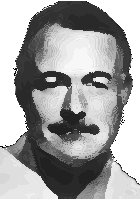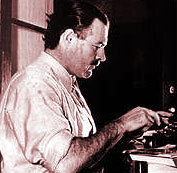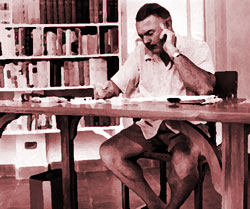
|
||
| Volume II, Issue II | Summer 2003 | |
| Summer 2003 Home Page |
| Culture, Politics & Technology |
| Fiction |
| Music |
| Poetry |
| Theater |
| About / Contact |
| Archive |
| Current Home Page |
Hemingway still kicks ass
This article originally published in Fahrenheit San Diego.
 Ernest Hemingway still matters more than any other American writer, some four decades after blowing his own brains out, because he didn't give a damn about anything other than finding a way to truth.
Ernest Hemingway still matters more than any other American writer, some four decades after blowing his own brains out, because he didn't give a damn about anything other than finding a way to truth.
He matters because he was a larger than life figure, a man who could be admired or despised, but hardly ignored.
Mostly, though, he matters because people still read him.
His people.
Americans.
More than any other writer since Mark Twain, Ernest Hemingway defines American literature. Earthy. Quick. Immediate. Full of bright colors and loud noises.
Hemingway changed the course of American letters; writers like Hunter S. Thompson and Tom Wolfe wouldn't even exist without Hemingway's example of immersing yourself in the story. He excised the neutral observer and proved that you could get closer to that elusive goal of truth by jumping into whatever you were writing about, whether it was bullfighting or marlin fishing, a revolution or a safari.

And so like other great artists of his generation, giants like Humphrey Bogart and Frank Sinatra, Count Basie and Leonard Bernstein, Hemingway managed to create art and serve as a pop icon all at the same time with no betrayal or hypocrisy.
Because of that, Hemingway still matters a very great deal.
What's perhaps most interesting about this is that Hemingway retains his heavyweight status despite the longstanding and desperate efforts of literary critics and university literature professors to tear Hemingway down, to – in their own jargon – deconstruct him.
For those uninitiated into the cult of the literati, "deconstruction" refers to a high-falutin' method of trying to destroy someone's public reputation. The high-brow crowd will pooh-pooh that description, and comfortingly assure us that all they're doing is re-evaluating the work and impact of whomever is in their cross-hairs, trying to get past all the hype and commotion to get a handle on the reality of the person's oeuvre (fancy talk for a life's work).
But the truth is that deconstruction is the preferred weapon of cowards, for those too weak to look their adversary in the eyes while doing their dirty work.
 There are major university English programs in this nation where you can earn a degree in American letters without ever reading Hemingway, without knowing one iota about the person most responsible for shaping post-war American literature.
There are major university English programs in this nation where you can earn a degree in American letters without ever reading Hemingway, without knowing one iota about the person most responsible for shaping post-war American literature.
It's shameful.
Compare Hemingway with the favorite children of America's literary snobs: Gore Vidal. Norman Mailer. John Irving.
Who in your social circle has read any of them? Yeah? How about since leaving college?
While Vidal is all but forgotten by the general public, Mailer writes a book admitting he was overrated, and Irving's novels are increasingly in the discount bin, Hemingway was on the best-seller's list just four years ago – 38 years after his death – when his last posthumous novel, "True at First Light," was published.
Americans actually read Hemingway. Real Americans, from SUV-driving soccer moms to long-haul truck drivers. Short-order cooks to investment bankers. Hemingway is part of the common glue that defines American culture.
Why? Why is a man who is despised by the nation's literary elite still the best-read of our serious writers?
For the same reason folks still listen to Sinatra and Ellington, still rent movies with Bogart and Katherine Hepburn.
He had balls.
Hemingway didn't give a damn what anyone thought about him. Life was here, to be seized and enjoyed, preferably with a good whisky and a belch at the end of the day.
He was a man's man, and if you didn't like him, then too bad for you.
Sure, people nearby got hurt by what he wrote down in his novels and short stories. That's the price of truth – sometimes it stinks. It was a point made by his son Patrick, who edited "True at First Light," and wrote in the introduction that he hoped his stepmother could forgive his father's writing so much about his mistress in Africa.
But for Hemingway, he couldn't write truthfully about his African journey without writing about the local girl he took up with, even if it hurt the wife he loved. He might even have admitted he shouldn't have taken up with the girl – but not write about it after the fact? That would have been an even greater betrayal.
Now, maybe that made him a lousy husband and father.
But it is also what sets him apart, makes his writing so grand; it's why folks still read him and always will.
It's why he matters.
![]()
Summer 2003 Culture, Politics & Technology Section | Summer 2003 Main Page |
Current Culture, Politics & Technology Section | Current Home Page
Copyright © Turbula.net